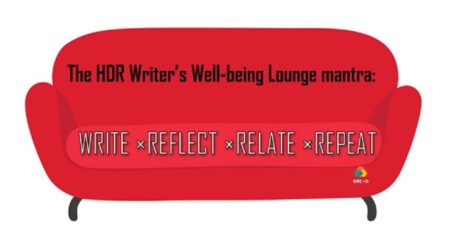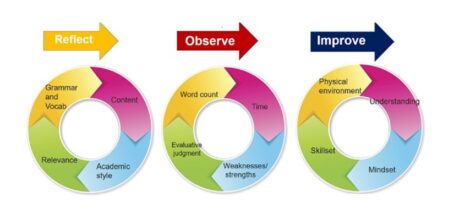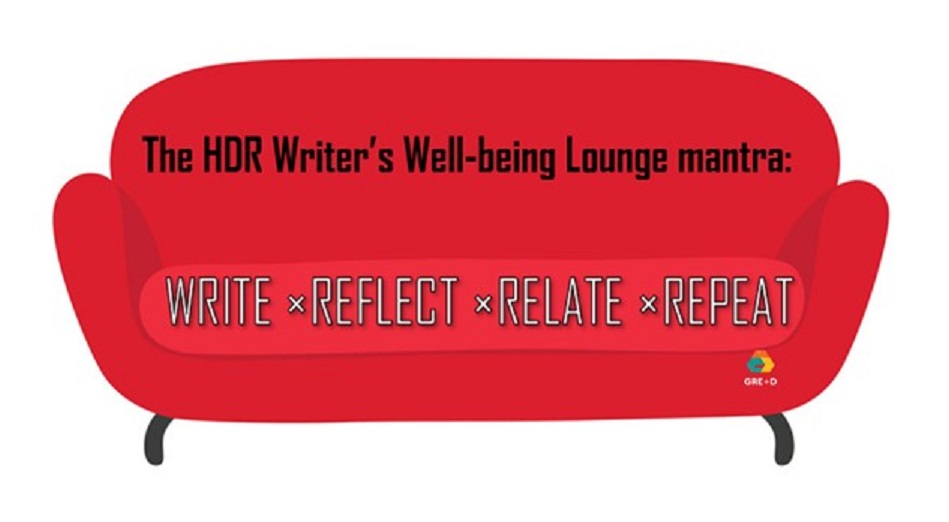Natasha Kitano, Language and Learning Educator, Graduate Research Education & Development team (GRE+D), Queensland University of Technology (QUT)
and
Aleksandra Olechnowicz, Online Module Administrator, Graduate Research Education & Development team (GRE+D) e-Grad School Australia (creator of video)
The HDR Writer’s Well-being Lounge (the Lounge) in the Graduate Research Education and Development (GRE+D) program at QUT was created at the start of 2020 to help higher degree research (HDR) students combat the isolation that is often felt during the HDR journey. As a Language and Learning Educator (LLE) with the GRE+D team, I identified the need to create a space specifically for HDR students, who given their unique role within the university, are separated from undergrad cohorts. HDR students participate in focused writing sprints in the Lounge, however, unlike a Shut up and Write session, the Lounge is also a place where students can connect with peers which promotes their well-being.
The Lounge became incredibly relevant at the height of COVID-19 when the global pandemic compounded student isolation. The sessions quickly transitioned to the online space which allowed remote students to also benefit. In 2021, the Lounge has become a weekly online event. The mantra of the Lounge is Write – Reflect – Relate – Repeat, and it is a space for HDR students to gather together to write, reflect on their writing and relate to other HDR students on HDR matters.

Student feedback
- “Attending the Lounge is a transformative decision and can break up large slabs of isolation bringing more focus and clarity”.
- “It’s a wonderful resource for reluctance, but it also enhances confidence and normalises some of the negative self-talk”.
Impacting focused writing and reflection
One of the main purposes of the Lounge is for students to ‘get some writing done’. I tell my HDR students to write early and write regularly. Too often, HDR students assume that writing comes after their research. Rather, HDR students need constancy and moderation in their writing, and writing in brief regular sessions can lead to writing more productively, painlessly and successfully (Boice, 1990). This notion is not new. In fact, it is analogous to the ideas of Scotland’s pioneering economist and philosopher Adam Smith who in his book ‘The Wealth of Nations’ (1776) states that “only with the moderation of doing important work in brief bouts are we likely to persist at it with a constancy that brings greater productivity, health, and happiness in the long run” (Boice, 2000). Students who participate in weekly writing sessions can lessen the anxiety they have about writing and mitigate the guilt they may have about not getting around to it.
Every Lounge begins with focused writing using the Pomodoro technique which is a twenty-five-minute uninterrupted writing sprint using the Pomodoro timer (https://pomofocus.io/). The students outline their plans for the writing sprint on a centralised Padlet (https://padlet.com) which supports the notion of participating in a community of practice (Wenger, 1999).
After the writing sprint, I walk the students through the process of how to reflect on the words they have written. The students focus on areas, such as grammar, vocabulary, content, academic writing style and relevance. Reflection is a great tool for students to consolidate their knowledge and audit their academic writing skills in order to make appropriate changes (Cahusac de Caux et al., 2017). I also encourage them to observe and improve their writing habits and academic practices.

Student feedback
- “I found it an unbelievably productive two hours”.
- “I like the pomodoro method and having someone direct the time makes it easier to commit to writing”.
- “I have found that taking the time to reflect on my writing has been beneficial”.
Impacting connections and well-being
The third stage of the Lounge process -relate- provides the opportunity for students to forge relationships and connect. During each Lounge, students go into breakout rooms online and have a chance to meet or reconnect while discussing HDR related topics. Providing a space where students can connect and support each other helps them maintain their well-being. Peers can be a great source of emotional, social and intellectual support (Dowling & Mantai, 2015), and this part of the Lounge allows the students to normalise much of the HDR journey. The familiarity and collegiality created in this part of the Lounge can support the writing and reflecting processes too.
The success of these Lounges is supported by Vygotsky’s (1978) early work which suggests that learning develops as a transaction between the learner and their environment. His work demonstrates that there is an innate social nature in learning, and the Lounges reflect this social learning paradigm and allow the students to participate in a learning community. Despite the physical distance between the students, there is a sense of togetherness as they all write independently, yet collectively. The popularity of these Lounges has highlighted the desire HDR students have to connect especially during the uncertainty that was witnessed in 2020. The Lounges also address the growing need for universities to promote the health and wellbeing of their students as these factors play a critical role in learning, productivity and engagement (Van Kessel et al., 2021).
Student feedback
- “I enjoy knowing that I am not alone and the sense of community”.
- “If you’re drowning in HDR doubt, give it a go”.
- “It did help me to focus to write intensively. Also, sharing thoughts with other peers was so helpful to relax my mind”.
Because writing is the principal channel students use to communicate their ideas and is the foundation on which their degree is awarded (Cotterall, 2011), it is paramount to provide HDR candidates with support and motivation, so they can build confidence as writers and develop their sense of scholarly identity. Regular focused writing, reflection and connecting with peers can bring numerous salient benefits to students on their HDR journey.
References
Boice, R. (1990). Professors as writers : a self-help guide to productive writing. New Forums Press.
Boice, R. (2000). Advice for new faculty members: Nihil nimus. Allyn & Bacon.
Cahusac de Caux, B. K. C. D., Lam, C. K. C., Lau, R., Hoang, C. H., & Pretorius, L. (2017). Reflection for learning in doctoral training: Writing groups, academic writing proficiency and reflective practice. Reflective practice, 18(4), 463-473.
Cotterall, S. (2011). Doctoral students writing: where’s the pedagogy? Teaching in Higher Education, 16(4), 413-425.
Dowling, R., & Mantai, L. (2015). Supporting the PhD journey: insights from acknowledgements. International Journal for Researcher Development, 6(2), 106-121. https://doi.org/10.1108/IJRD-03-2015-0007
Van Kessel, G., Brewer, M., Lane, M., Cooper, B., & Naumann, F. (2021). A principle-based approach to the design of a graduate resilience curriculum framework. Higher Education Research & Development, 1-15.
Vygotsky, L., & Cole, M. (1978). Mind in Society: Development of Higher Psychological Processes. Harvard University Press.
Wenger, E. (1999). Communities of practice: Learning, meaning, and identity. Cambridge university press.


3 comments
As a regular attendee of the Writer’s Lounge — it is awesome! Always the most productive 2 hours of my week, and it is great to connect with my peers and learn about their experiences and strategies that they find helpful.
The Writers Lounge has not only provided me with a space for getting some work done and connecting with peers, Natasha has modeled a framework which I utilise when attempting to work on my own. I have found the reflection post-sprint really helpful to step out of the work to see how I’ve gone but also to stay focused on my task. Often new insights have arisen through reflection. It’s amazing how much work can get done in 25 minutes. Thank you Natasha for this space for us guiding us through what can be a lonely process.
As a new QUT HDR student, the Writer’s Lounge has been an important weekly session to focus on my writing. The sessions are also underpinned by a weekly topic that ensures I continue to develop the skills & capability to write & self-reflect using the reflect, observe & improve model. The weekly topic facilitated by Natasha provides a great conversation starter to engage with other HDR students sharing their tips & strategies for writing, researching, & staying sane – some of whom are much further into their HDR journey. Additionally, break-out sessions help expand my network of support & dissolves any feelings of isolation or anxiety, or negative self-talk. I find that I remain focused & invigorated to continue writing after the sessions. I would highly recommend these sessions to any HDR student from first to final year.